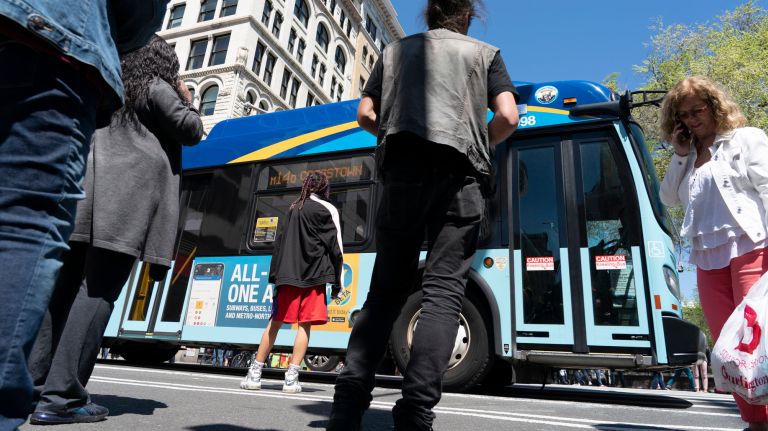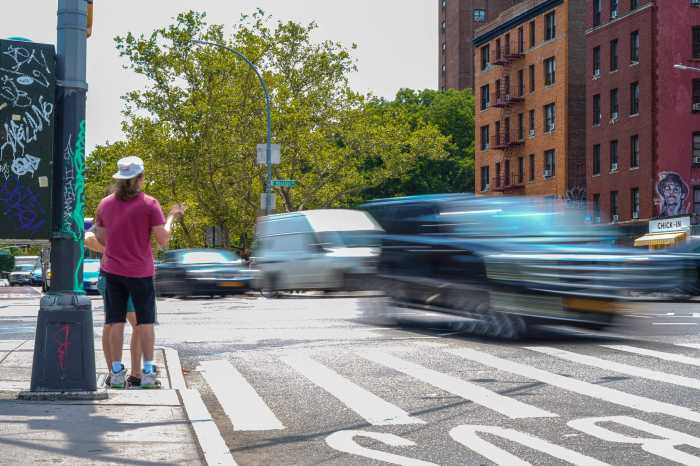
A new group hopes to force gas-guzzling vehicles out of New York’s government.
ElectrifyNY, a coalition of transit and environmental groups, has formed to call for New York State and local municipalities to transition to fully electric vehicles by 2040.
Transportation is the largest contributor to greenhouse gases in the state, and the only sector where emissions haven’t decreased since 1990, according to state data. On Thursday, the group targeted buses and other mass transit-related vehicles in the state.
“It is a public health and climate justice imperative that we reduce greenhouse gas emissions in the transportation sector,” said Renae Reynolds, a coalition organizer from the NYC Environmental Justice Alliance, at a news conference outside a Manhattan MTA bus depot, “… to ensure the health and safety of our communities who rely on public buses and other vehicle modes to get where they need to go.”
The MTA — the nation’s largest transit agency — has already committed to making its bus fleet entirely electric by 2040 under NYC Transit President Andy Byford, and is currently undergoing a three-year pilot program with 10 electric buses. The MTA recently purchased 15 all-electric articulated buses and charging stations for the Michael J. Quill Depot in Manhattan — a chunk of the 60 electric buses the authority has committed to buying under its current capital plan.
Going electric poses specific challenges for the MTA, according to Nick Sifuentes of the Tri-State Transportation Campaign, an ElectrifyNY coalition member. Not only does the Transit Authority still need to buy the buses, it also needs to buy charging stations for depots and along bus routes. Questions also have been posed as to how electric buses could weather a cold winter, when heating could drain batteries, in addition to concerns about resiliency if a natural disaster were to knock out the power grid.
“These are real challenges, and that’s something the MTA is grappling with actively, but are they going to be solved? Absolutely,” Sifuentes said. “We have to make this transition, and technology is evolving rapidly on this front.”
The coalition is calling for the MTA to release a “detailed plan and timeline” for its 2040 goal.
"We’re proud of our environmental leadership and excited about our efforts to ultimately have a zero-emission bus fleet which will make the MTA’s benefits to the environment even stronger," said Shams Tarek, an MTA spokesman, in a statement, without addressing the demands from the coalition.
On the city’s side, Mayor Bill de Blasio has faced criticism for adding more than 5,000 vehicles to the city’s current fleet of 25,690 government vehicles. In March, de Blasio said he planned to reduce emissions from the city’s municipal fleet by 80 percent by 2050 through a removal of 1,000 city vehicles, and to reduce the number of take-home cars by 500.
The city currently has 1,750 electric vehicles and plans to increase that number to 2,100 this summer, according to Keith Kerman, the chief fleet officer at the city’s Department of Citywide Administrative Services. Kerman championed the benefits of electric vehicles over gas-powered cars at the rally Thursday, but did not speak to whether the city would commit to an all-electric fleet goal by 2040.
The administrations of de Blasio and Gov. Andrew M. Cuomo did not immediately respond to a request for comment.
“Gas vehicles are not just unacceptably polluting, they’re ridiculously inefficient,” Kerman said. “Do you know that 80 percent of the fuel you put in a vehicle does not propel the vehicle? It is complete waste.”





































